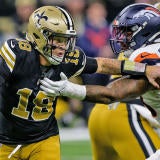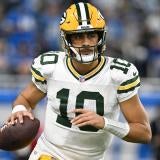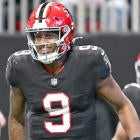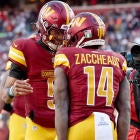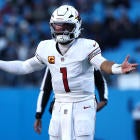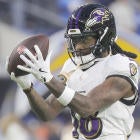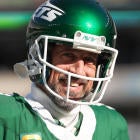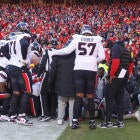Back in May the NFL writers and editors at CBSSports.com gathered together to discuss the key figures and moments of every NFL franchise in the Super Bowl era. Before long we were discussing every team's best and worst moments, along with their most-hated players and coaches, as well as some of the more bizarre things each team has been involved in. That spirited discussion produced this series -- the Good, Bad, Ugly and, sometimes, Bizarre moments for every team. We continue with the Buffalo Bills.

The Good
Jim Kelly and the K-Gun
In an era of no-huddle offenses, in a league where Chip Kelly's relentless shotgun, no-huddle attack can turn Nick Foles into a 27-touchdown, two-interception quarterback, it can be easy to forget that, just 30 or so years ago, the idea of using the no-huddle as a standard offensive approach wasn't even an idea, really.
Maybe in 30 more years, the idea will finally reach Andy Reid's ears. Maybe.
Even after it morphed into an idea, it wasn't used the way teams use it today. The bridge between the idea becoming an idea and the idea becoming an NFL weapon was a team from Orchard Park, New York, a suburb of Buffalo.
A team that nearly pulled off the greatest four-year stretch in the history of football.
The Bills didn't invent the no-huddle offense, but they weaponized it into one of the most devastating tools in the game. Against the Eagles on Dec. 2, 1990, Bills head coach Marv Levy handed over control of the offense to quarterback Jim Kelly, who called the shots without huddling. They called it the K-Gun, which wasn't actually named after Kelly, but after tight end Keith McKeller.
The offensive system impacted Kelly immediately, specifically in the form of a 63-yard touchdown in the first minute of the game. By the end of the first quarter, Kelly had gone 8-for-8 for 229 yards and three touchdowns, as the team's website chronicled a year and a half ago.
"They were not used to going at that pace," Kelly said, per the Democrat & Chronicle.
Defenses never really made the full adjustment. From 1990 to 1993, Kelly threw for 13,512 yards (the second-most in that span) and 98 touchdowns (the most in the span). The Bills headed to four consecutive Super Bowls -- the longest streak in the history of football.
We'll get to the ugly side of those four Super Bowls in just a moment -- after all, there's a reason why that four-year run was nearly the greatest run in NFL history -- but let's take a moment to appreciate it first.

From 1990 to 1993, the Bills won 49 regular-season games and lost 15. Factoring in the postseason, they went 58-19 for an absurd winning percentage of .750. That's Belichick-esque.
And to think, that run never should've happened, because Kelly never should've ended up in Buffalo. Heck, he nearly didn't even end up in the NFL. In the final year of his Hall-of-Fame career at Miami, Kelly suffered a season-ending shoulder injury.
It nearly ended his NFL career before it even began. When Kelly surfaced after surgery, he heard something alarming.
"The first thing the doctor said to me was, 'I hope you studied,'" Kelly said, per the Bills' website. "And I said, 'Why is that?' He said, 'We had to insert three metal rods in your arm and it was a lot worse than we thought it was.'"
After Kelly sidestepped that bullet, he headed to the draft, where he watched John Elway refuse to play in Baltimore with the Colts.
"My agent looked at me after Elway got picked and the problem that arose from it and he said, 'Hey Jim, is there anywhere that you don't want to play?' I said, 'Oh yeah, I don't want to play for the Minnesota Vikings,'" Kelly said. "'I don't want to play for the Green Bay Packers and I don't want to play for the Buffalo Bills.'"
The Bills took Kelly with the 14th pick in the draft.
"I couldn't believe it," Kelly said. "Within minutes the phone calls came and with me being politically correct I was saying how excited I was to be a Buffalo Bill. And when I hung up I said, 'We need to call the USFL and see what other options we have.'"
The story gets weirder, as Chris Brown of the Bills' website explained:
The Chicago Blitz had the rights to Kelly, but the quarterback still wasn't sure if the USFL was the way to go with his career. He and his agent eventually went to Buffalo to negotiate a contract with interim GM Pat McGroder. Just when significant progress had been made and Kelly was close to signing there was an urgent call that came in to One Bills Drive for Kelly's agent.
"We were about ready to sign the contract with Buffalo," said Kelly. "But there was a representative from the USFL on the phone and they said, 'Tell Jim to not sign anything. We've got an offer he cannot refuse.'"
The offer was to play for any USFL team of his choosing. Though the Blitz had the rights to Kelly, they weren't convinced he would ever come and play for them. Chicago thought it better for the fledgling league to have as many star quarterbacks as they could in the USFL no matter where they played and agreed to give Kelly the option of playing for whatever team he wanted.
"Of course my agent came back in and we left the room without signing anything," said Kelly. "Had that secretary not walked into the room I probably would've been a Buffalo Bill in 1983."
Kelly ended up in the USFL instead and even won an MVP with Houston Gamblers before eventually joining Buffalo in 1986. In Kelly's 11-year NFL career, he racked up 35,467 yards and 237 touchdowns. Today, Kelly resides in the Hall of Fame.
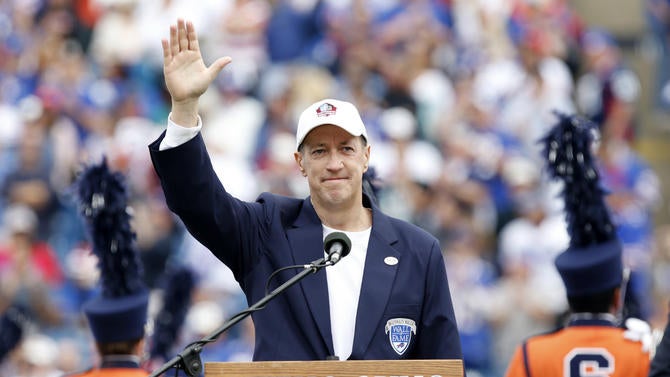
For his success, Kelly credits Levy and the K-Gun.
"He is the reason I'm on that Wall (of Fame)," Kelly said of Levy. "He had enough guts back in the day to let a quarterback wearing No. 12 to call the plays."
In his post-NFL life, Kelly has fought off cancer. As of this past January, he's cancer free.
The Bad
Wide right
But Kelly and the K-Gun never led to a championship.
Despite those four consecutive appearances in the Super Bowl, the Bills failed to secure a title. In those Super Bowls, they lost by an average of 16.5 points, so at least they let down their fans in the nicest possible way.
Just kidding, of course.
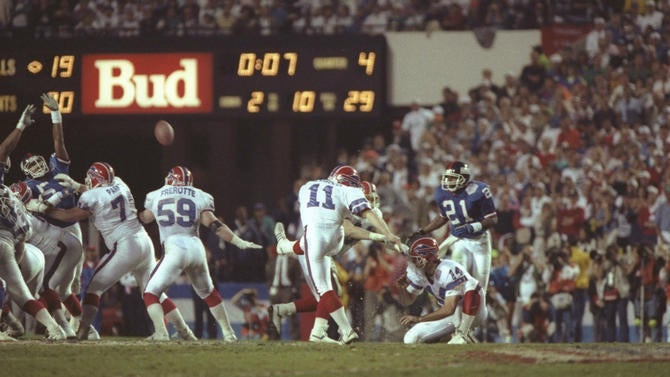
If you're ever given the choice of getting hit by a train or getting bitten by a tarantula, falling out of your chair, paralyzing yourself, and lying helplessly as the tarantula eats you alive, always pick the first option. Go with the quick, painless death.
Just ask the Bills. They picked the tarantula option following a 13-3 season in 1990.
In the Super Bowl, the Bills didn't let their fans down easy. Instead, they made them believe they were a mere field goal away from winning their first Super Bowl. With eight seconds remaining in the game, the Bills trailed the Giants by a single point. So, situated just inside the 30-yard line, they sent out Scott Norwood for a game-winning 47-yard field goal.
"I had no doubts in my mind," Norwood said years later, per SBNation.
Instead of sealing the Bills' first-ever championship, he provided the most devastating moment in Bills' franchise history. The kick sailed "wide right," as Al Michaels exclaimed on the TV broadcast, effectively ending Super Bowl XXV.
Norwood lasted one more season with the Bills. He didn't play in the NFL again.
OK, so let's provide a defense for Norwood here, because he definitely deserves one. For one, the kick was hardly a gimme. In Norwood's career, he went 37 of 61 on field goals from 40-49 yards. So it's not as if Norwood choked -- he shanked a kick that he missed roughly 40 percent of the time.
Second, let's look at the events that led to that missed kick. After scoring 95 points in their first two playoff games, the Bills offense scored 19 in the Super Bowl (see: Bill Belichick). After forcing 10 turnovers in their first two playoff games, the Bills defense got shut out in the Super Bowl.
The game will be remembered for Norwood's miss, which is why it's the worst moment in franchise history, but blaming Norwood and him alone is like solely blaming Hayden Christensen for the awful Star Wars prequels. Was he good in those movies? Of course, not. But he was being asked to act alongside Jar Jar Binks! A lot of other actors would've failed in that endeavor, as well.
Norwood let his team down by shanking the kick. But many other kickers -- especially those not named Adam Vinatieri-- would've succumbed under those circumstances, too.
The Ugly
O.J. Simpson
From 1969 to 1977, O.J. Simpson was too good to be true. Over 10,000 rushing yards. Fifty-seven rushing touchdowns. Twelve more through the air. On the field, Simpson was as sure of a thing as sure things get.
Then, the well-documented downfall. By now, you know the story. Simpson, who finished out his career in San Francisco before turning to the world of film, was accused of murdering Nicole Brown Simpson and Ronald Goldman in 1994. In a highly publicized, highly controversial trial, Simpson was acquitted of the charges.
But in 1997, a civil court case found Simpson liable for their deaths and he was told to pay $33 million. And let's not forget about the car chase that cut into the NBA Finals. Simpson is currently serving a prison sentence for kidnapping and armed robbery.
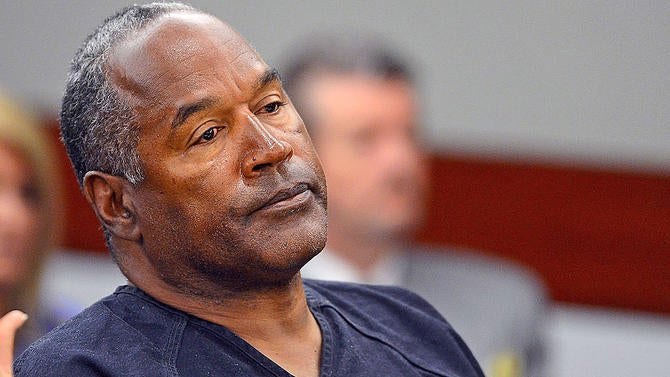
That's the part we all already knew. The complicated part in all of this is the Bills' relationship with Simpson, as Yahoo Sports' Eric Edholm delved into this week:
You have to dig to find Simpson's name on the Buffalo Bills' official website. Yet he's a member of the team's Hall of Fame and Wall of Fame. But you can't buy a Simpson No. 32 jersey either on the team's site or on the NFL.com shop.
Still, those Simpson No. 32 jerseys show up at Bills games every week -- and were considered hot collectibles at one point. But then again, O.J. wasn't named to the franchise's fan-voted 50th anniversary team in 2009; Thurman Thomas was the pick at running back.
It's a complicated relationship for sure.
"It's schizophrenic," said Gene DiFrancesco, a Buffalo native and lifelong Bills fan. "One camp believes he did it and should be taken off the stadium's Wall of Fame. Another camp is in denial. And the last camp privately loves him, maintained relations and would invite him to their luxury boxes after the trial.
Edholm's entire story, on a somber and complex topic, is well worth a read -- especially when you need a 10-minute break during your O.J.: Made in America binge.
Bizarre
Frank Reich's comeback
During Frank Reich's career in Buffalo, which spanned nine years, he never started more than three games in a single season. Throughout his 13-year playing career, he started a total of 20 games -- 22 games, if you include the postseason.
Yet he somehow still managed to engineer the greatest comeback in the history of the NFL. Talk about taking advantage of your opportunities.
Reich wasn't even supposed to start the 1992 Wild Card Game against the Oilers in January of 1993. But in the final game of the regular season, which also came against the Oilers, Kelly strained his knee. So, Reich commandeered the offense.
He ended up leading them to 41 points, completing nearly 62 percent of his passes for 289 yards and four touchdowns. He out-dueled Warren freakin' Moon.
But, again, that's not why Frank Reich and this game is the "bizarre" of the Bills' franchise. Any quarterback, regardless of their talent level, can win a playoff game. Just ask Tim Tebow, Trent Dilfer, and Peyton Manning's corpse.
Reich led the Bills back from a 32-point second-half deficit. At halftime, when the Bills trailed by 25 points, this is what head coach Marv Levy told his team (via ProFootballHof.com):
"You've got thirty more minutes. Maybe it's the last thirty minutes of your season. When your season's over you're going to have to live with yourselves and look yourselves in the eyes. You'd damn well better have reason to feel good about yourselves, regardless of how this game turns out."
Holy cow! That's the Leonardo DiCaprio of pep talks. Speaking of which, someone let Leo play Levy in the movie so he can perform that speech. He might even give Kurt Russell's Miracle speech a run for its money.
The Bills received Levy's message -- well, after a pick-six opened up the second half, which seemingly doomed the Bills. Then, the Bills went to work.
It started with some luck, as the Oilers handed the Bills the ball at the 50-yard line due to a botched squib kick. A 10-play drive followed, punctuated by a 1-yard touchdown plunge. Reich then found Don Beebe for a 38-yard touchdown. Next, he located Andre Reed on a 26-yard score. He hit Reed again, this time for a 18-yard touchdown. With a quarter still to go, the Bills had trimmed the deficit to four points.
And those who left the stadium began climbing back in -- literally. As Vic Carucci wrote:
Many of those who had left and were listening to the game on the radio turned around and headed back to the stadium. Because their tickets didn't permit re-entry, they began climbing over the fences to get back in. Security guards tried to stop them at first, but they eventually relented.
Reich and Reed -- again -- entered the end zone to give the Bills the lead in the fourth quarter. After an Oilers' field goal, the game headed to overtime. That's when Steve Christie -- the kicker who replaced Norwood -- finished off the greatest comeback ever with a 32-yard field goal.
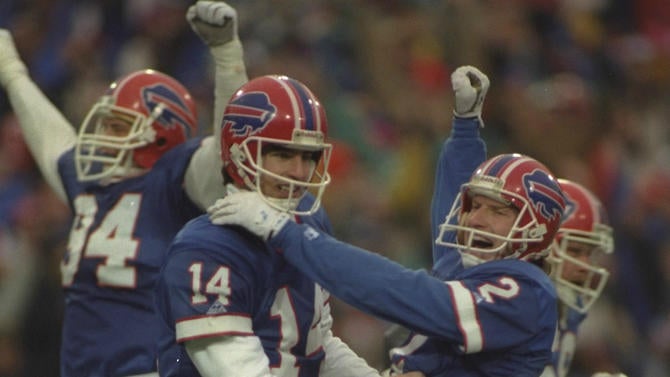
Relive the magic here.
* * *
More Good, Bad, Ugly and the Bizarre
Where's your favorite NFL team? Check the schedule below
AFC East
- June 13: New England Patriots
- 14: Miami Dolphins
- 15: New York Jets
- 16: Buffalo Bills
NFC East
- June 17: Dallas Cowboys
- 20: New York Giants
- 21: Philadelphia Eagles
- 22: Washington Redskins
AFC West
- June 23: Denver Broncos
- 24: Oakland Raiders
- 27: Kansas City Chiefs
- 28: San Diego Chargers
NFC North
- June 29: Chicago Bears
- 30: Detroit Lions
- July 1: Green Bay Packers
- 4: Minnesota Vikings
AFC South
- July 5: Houston Texans
- 6: Tennessee Titans
- 7: Jacksonville Jaguars
- 8: Indianapolis Colts
NFC South
- July 11: Carolina Panthers
- 12: Tampa Bay Buccaneers
- 13: Atlanta Falcons
- 14: New Orleans Saints
AFC North
- July 15: Pittsburgh Steelers
- 18: Baltimore Ravens
- 19: Cincinnati Bengals
- 20: Cleveland Browns
NFC West
- July 21: Arizona Cardinals
- 22: Los Angeles Rams
- 25: Seattle Seahawks
- 26: San Francisco 49ers




